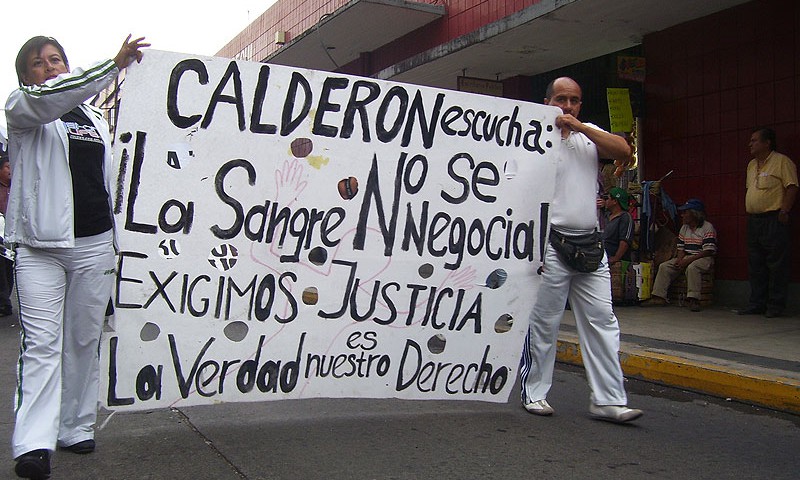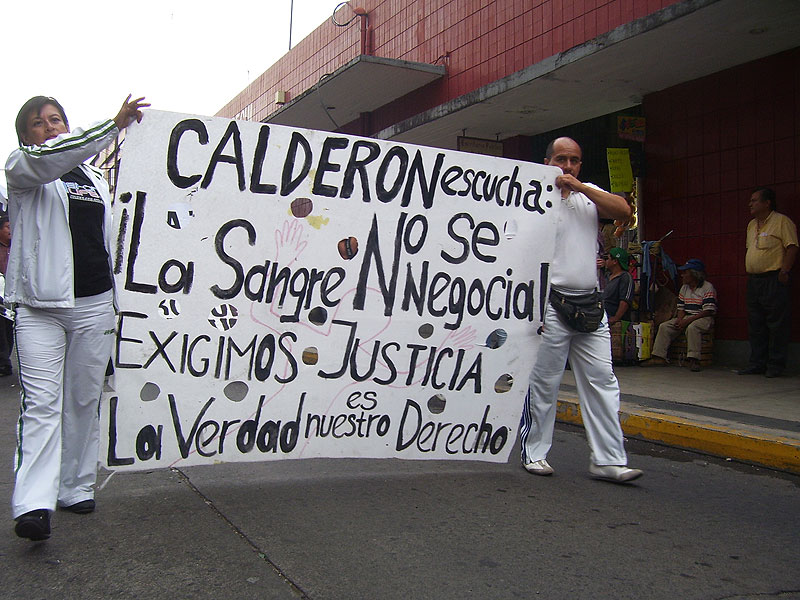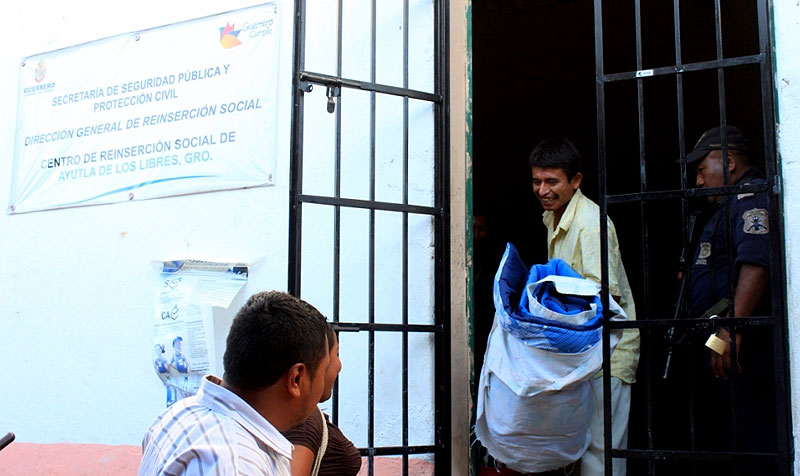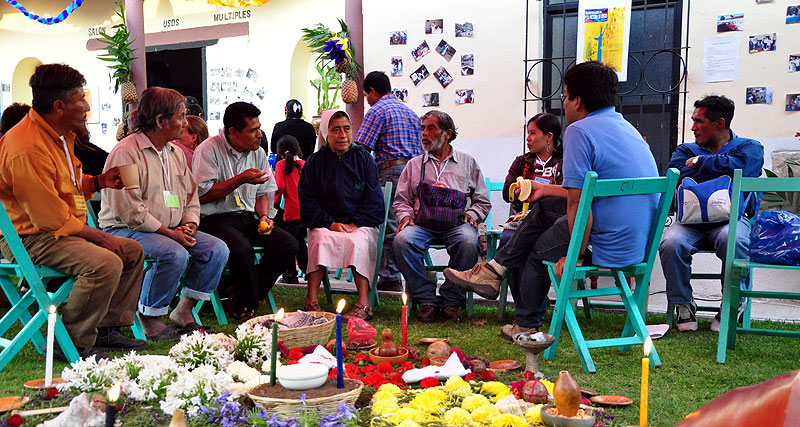PRESENCE OF TRANSNATIONAL CORPORATIONS
31/03/2012ANALYSIS : Mexico – Elections and fear that history may be repeated
28/08/2012On 30 March, electoral campaigns were formally opened for the presidential elections that are programmed to take place on 1 July. Enrique Peña Nieto, ex-governor of the state of Mexico and representative of the coalition “Commitment to Mexico”, which is made up of the Institutional Revolutionary Party (PRI) and the Green Ecological Party (PVEM), has maintained the lead in the polls. But the difference among the three primary candidates has been decreasing. In these polls, the second-place position is being fought over by Josefina Vázquez Mota, ex-Secretary for Social Development and ex-Secretary for Public Education for the ruling National Action Party (PAN), and the former presidential candidate Andrés Manuel López Obrador, candidate for the Progressive Movement, which is comprised of the leftist parties of the Democratic Revolution (PRD), Labor (PT), and the Citizens’ Movement. Both candidates have built part of their campaigns in opposition to Peña Nieto, seeking to block the possible return of the PRI to power (after having governed Mexico for over 70 years, this party lost the presidency to the PAN in 2000). The final candidate is Gabriel Quadri de la Torre, from the New Alliance Party (PANAL), whose probabilities of winning are almost null. However, he is trying more than anything else to maintain the registration of his party.
The presidential campaigns in course are occurring within a context that several social actors have characterized as being one of “national emergency.” In March, some 70 organizations from 26 states and more than 100 personalities launched a “Proclamation for the rescue of the Nation,” in which they called on civil society to join efforts to demand peace in these electoral moments. They denounced that “the institutions of the State are immersed in processes of profound decomposition and deterioration due to corruption and the penetration of organized crime in all levels and fields of government.” They warned furthermore that “we face the grave risk that the candidates to succeed the present president will continue with the commitment to the present strategy that is provoking a humanitarian disaster.” Repeatedly, the Movement for Peace with Justice and Dignity (MPJD), launched by the poet and journalist Javier Sicilia last year, has also warned that the violence generated both by organized crime and governmental policy has not only not ceased but rather is increasing alarmingly, and that impunity persists in the majority of cases. It is estimated that since the 2006 launch of the war on drugs, at least 50,000 persons have lost their lives.
Governmental and legislative advances: better late than never
Over the course of the month of April, a series of accords and laws were passed that are very significant for those concerned with human rights, given that some of them correspond intimately to the social demands made in recent years. In April, President Felipe Calderón suggested changes for the legitimate use of force, the detention of persons, the chain of command, and preservation of evidence. According to Calderón, these reforms constitute a response to recommendations of national and international human-rights organizations. Nevertheless, the content of these reforms seemed to indicate that public bodies of security “now have a much more solid legal basis to continue carrying out their tasks as they have done until now: with respect for legality and with respect of the rights of the persons.”
The same month, Senate commissions agreed to classify feminicide as a grave crime, with punishments of between 40 and 60 years imprisonment and a fine of 500 to 1000 days of minimum wage to those who take the lives of women for reasons of gender. The Senate also approved a General Law on Victims, which, upon being ratified by the Chamber of Deputies, will obligate the State to guarantee assistance, protection, and compensation for damages to the victims of violence and human-rights violations. Finally, the Chamber of Deputies approved the minute of the Senate that calls for a Law for the Protection of Human-Rights Defenders and Journalists.
Legislative changes occurring within a context of sustained challenges to Mexico
Certainly, these changes on the part of the government and the Congress have taken place within a context in which repeated challenges had been directed at Mexico regarding the human-rights situation lived in the country. On 6 March, for example, the Second Report on the Situation of Human-Rights Defenders in the Americas published by the Inter-American Commission on Human Rights (IACHR) was one of these. In the case of Mexico, the IACHR reported that 61 activists were killed in the country between 2006 and 2010, and that many of the death-threats and aggressions were carried out by security agents of the State itself.
In March, the organization Article 19 for Mexico and Central America presented its report “Forced Silence: The State complicit with violence against the press in Mexico,” which documents 172 aggressions against journalists in 2011. The report also notes that the principal aggressor continues to be the State, thus contradicting the “version presented by President Felipe Calderón, which attributes violence against the press to organized crime.” In the first few months of 2012, in place of decreasing, this tendency has worsened. Six journalists were killed in less than a month between April and the third week of May.
In May, press sources reported that the United States was considering withholding 15% of the aid corresponding to the Mérida Initiative, which was made conditional to the human-rights situation in Mexico. On 10 May, Kathleen Fitzpatrick, Adjunct Sub-secretary of State for Civil Security Affairs, Democracy, and Human Rights, revealed that, while it is true that Mexico has successfully advanced in legislative terms, “there still remains much work to be done from here on regarding the implementation of these laws,” stressing that “impunity remains one of the most important obstacles for the Mexican judicial system, whose capacity of imparting justice continues to be limited.”
Chiapas: increase in social mobilization within an electoral context of multiple re-accommodations
In Chiapas, the 1 July elections will include charges for federal, state, and municipal office. This multiplicity of public posts has generated apparent ruptures and re-accommodations among the contenders. Significantly, several political parties have strongly challenged the direct intervention of the present governor, Juan Sabines Guerrero, in the naming of candidates. Among these re-accommodations that contribute to confusion can be included the candidate for the PRD government, the Labor Party, and the Citizens’ Movement, María Elena Orantes, who renounced the PRI this January. Another example could be Yassir Vázquez, who resigned from the post of mayor of Tuxtla Gutiérrez to run for gubernatorial candidate for the PRD. One day he was considered Sabines’ favorite (who himself rules through the PRD), but the next day, Vázquez was designated the Secretary General of the Green Ecological Party (PVEM) in Chiapas.
For the moment, the leader in the race for governor is ex-senator Manuel Velasco Coello, grandson of ex-governor of Chiapas Manuel Velasco Suárez (1970-1976). He represents a coalition comprised of the PRI, PVEM, and PANAL. Beyond him and the aforementioned María Elena Orantes, Emmanuel Nivón González, ex-mayor of Tapachula, will represent the PAN, and Marcela Bonilla Grajales will run for the local Party of Pride Chiapas (Poch).
In this context, several social organizations have once again repeated their demands by organizing forums, marches, sit-ins, and public denunciations. For example, since March, the National Front for the Struggle for Socialism (FNLS) initiated an indefinite sit-in in San Cristóbal de Las Casas. Also beginning on 14 April, and lasting until it obtained the reopening of a negotiation table with the state government. Another group of organizations also engaged in a sit-in in San Cristóbal, this one including the Emiliano Zapata Campesino Organization-Carranza Region (OCEZ-RC), the Emiliano Zapata Proletarian Organization (OPEZ-MLN), and the Center for Campesino and Popular Organizations (COCYP), among others. Their claims include agrarian demands and the release of political prisoners. The question of prisoners as a central element to the negotiations was clearly evident in the case of the detention of the leader Caralimpio Gómez Hernández, of the OPEZ-MLN, who was arrested in April after leaving a negotiation table with Noé Castañón, Secretary for Governance of Chiapas. Goméz Hernández’s son declared that Castañón told them that he would be released in exchange for the dismantling of the sit-in that the organization had been maintaining at that time in Tuxtla Gutiérrez. The action was then moved to San Cristóbal.
Among the most visible prisoners are found Francisco Sántiz López and Alberto Patishtán. On 16 March, the Good-Government Council (JBG) of Oventic denounced the unjust incarceration of Francisco Sántiz López, a Zapatista support-base, as well as of Lorenzo López Girón, who is unaffiliated in political terms; both of them are from Tenejapa, accused of a crime that occurred last December. On 27 March, the JBG reported that on 22 March it received notice that the two prisoners would be released from the San Cristóbal prison. However, Sántiz López was not released, given that he was charged with another crime—this one federal—the “bearing of arms exclusively for the use of the Army.” The case of Alberto Patishtán Gómez, member of the Voz del Amate, an organization of prisoners who adhere to the Other Campaign, who was transferred to Guasave, Sinaloa, last October on the request of the Chiapas state-government, has been at the root of many mobilizations. In March more than a thousand persons met in El Bosque, Patishtán’s hometown, to demand his return to Chiapas and his unconditional release. In May a “Forum against Political Prison and for the release of Alberto Patishtán,” was also held and a day later there began the “Week for Global Struggle for the Release of Patishtán and Sántiz López: To Tear Down the Walls of the Dungeons.”
Another question receiving growing attention by the media has been that of feminicide. The Chiapas chapter of the Peoples’ Permanent Tribunal (TPP) launched its first audience in San Cristóbal to address the problems of gender violence and feminicide on 7 and 8 March. On 14 May, about 1,200 persons in San Cristóbal and more than a hundred in Tuxtla Gutiérrez manifested in a simultaneous protest against feminicide and violence against women in Chiapas. The San Cristóbal march passed through the space known as the Sonora Fraccionamiento, where in April there was found the body of Itzel Janet Méndez Pérez, 17 years of age, with signs of having been raped.
Regarding impunity, in February, the Las Abejas Civil Society denounced the liberation of 6 persons indicated as having been material authors of the 1997 Acteal massacre. Of the 87 who were imprisoned for the crime, only 28 remain incarcerated. In April, Las Abejas warned also that “the children of the released paramilitaries […] were seen […] walking by calmly in the Acteal community, carrying the weapons of their parents […] because they saw that to kill and massacre an innocent people is the work of government that is well-paid, and that it receives rewards as recognition of service to the State.”
Oaxaca: growing distance between civil society and the government over the increase in death-threats and aggressions against human-rights defenders
Recent months have been marked by a significant increase in death-threats and aggressions against human-rights defenders in the state, despite the fact that the majority enjoy precautionary measures from the IACHR (Inter American Commission on Human Rights). On 15 March, Bernardo Vásquez Sánchez, spokesperson for the Coordination of the United Peoples of the Ocotlán Valley (COPUVO), was murdered after a meeting with state officials to analyze the existing conflict in the San José del Progreso municipality that has existed since 2008, due to the presence of the Cuzcatlán mining company, which is associated with the Canadian firm Fortuna Silver Inc. Two members of the same organization were injured in the attack.
Four months after experiencing a first break-in, during which computer equipment and archives documenting human-rights violations were stolen, the organization “Consortium for Parliamentary Dialogue and Equity Oaxaca” denounced a second break-in in March. In April, they denounced death-threats received from the same cell phone used to threaten other distinct rights-defenders including Alba Cruz from the Gobixha Committee for the Integral Defense of Human Rights (Código DH) as well as Francisco Wilfrido Mayrén Peláez, “Padre Uvi,” founder of the “Bartolomé Carrasco Briseño” Regional Center for Human Rights A.C., and the present coordinator of the Diocesan Commission for Justice and Peace, among others. In mid-May, following six death-threats since 2010, which have increased in recent months, the priest Alejandro Solalinde Guerra, director of the “Brothers on the Path” migrant home in Ixtepec, declared that he would leave the country for some months, indicating that the attacks could originate from organized crime or the government, given that “now there is no longer any difference between them.” He held Oaxaca’s former governor, Ulises Ruiz Ortiz, responsible for whatever aggression he or any member of his team could suffer.
In an act that has been considered as part of making social protest an act for court action, Lucila Bettina Cruz Velázquez, member of the Assembly of the Indigenous Peoples of the Tehuantepec Isthmus in Defense of Land and Territory (APIITDTT), was detained on 22 February. Cruz Velázquez was subsequently released on bail. A month later, five members of the Committee in Resistance to the Wind Project in Unión Hidalgo, adherents to the APIITDTT, were also arrested.
It cannot be denied that there has been a formal advance since the change of government in December 2010. Governor Gabino Cué has emphasized that “Oaxaca has passed from alternating power to democratic transition, following a political reform that transformed 33 articles of the state Constitution.” In March, another advance was made with the elimination of “arraigo” (type of informal detention pending some evidence to indict a person). However, civil-society organizations indicate that “If it is true that by means of the election of this alternative government, the people of Oaxaca succeeded in having a criminal mafia abandon the government, it is also true that the new state-government does not have the necessary power to succeed in profoundly changing society.”
In a failed opportunity for democratic consolidation and for more closeness between civil society and the government, on 9 May, the Oaxacan Congress named Arturo Peimbert Calvo as head of the Defense Committee for the Human Rights of the People of Oaxaca (DDHPO), a process in which organized civil society has participated actively. Militants of different organizations have protested, noting the intervention of the executive power in this election, and arguing that Peimbert Calvo is a governmental official – reason for which he should not be named the Ombudsman.
Guerrero: impunity, persecution, and militarization continue in the state
On 6 March, Alejandro Poiré, Secretary of Governance, together with Marisela Morales, Federal Attorney General, publicly apologized in the name of the Mexican State to Inés Fernández Ortega, a Tlapan indigenous woman who was raped by soldiers in 2002. This act was carried out in Ayutla de los Libres in observation of part of a sentence handed down by the Inter-American Court on Human Rights in November 2010 against Mexico. Inés Fernández denounced that despite this outcome, harassment continues against her by soldiers dressed in civilian clothes, as does that of discrimination and violation against indigenous peoples. She affirmed that “those from the government, though they say that they are on your side, will not complete their promises: they do not pay attention to them.”
In other news, on 20 February, with the participation of different human-rights organizations and community representatives, the third anniversary of the forced disappearance and extrajudicial execution of Raúl Lucas Lucía and Manuel Ponce Rosas, leaders of the Organization for the Future of the Mixteco People (OFPM) was observed. A new case was presented with the arbitrary detention of Maximino García Catarino, leader of the OFPM and beneficiary of provisional measures granted by the IACHR. After having been incarcerated for two months, he was released unconditionally on 20 March. The Tlachinollan Mountain Center for Human Rights has declared that his incarceration amounted to “systematic persecution against human-rights defenders” and the use of the justice system to silence dissent. Some minutes after leaving prison, Maximino García received a death threat by telephone.
The question of militarization also continues to be relevant in Guerrero. In mid-May, the Tlachinollan Mountain Center for Human Rights, the Institute for Security and Democracy, the Fundar Center of Analysis and Investigation, and the Civil Monitor of Police challenged the “recent announcement by Ángel Aguirre Rivero, governor of Guerrero, that he would soon begin to substitute soldiers for state police who are to retire due to age or who have not passed accreditation exams […] given that the militarization of the institutions of public security contradicts international standards on citizens’ security.”




